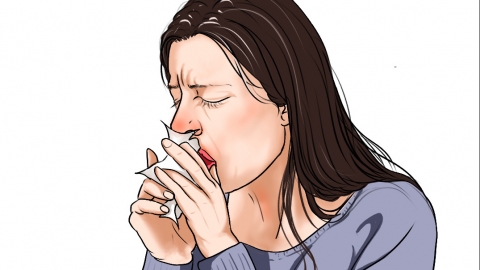What should I do for cough and sore throat?
Generally, the throat refers to the pharynx. Coughing and sore throat may be related to factors such as excessive voice use, poor sleep, pharyngitis, epiglottitis, and gastroesophageal reflux laryngopharyngeal disease. Treatment can be carried out under a doctor's guidance using general treatments or medication. If symptoms persist or worsen, timely medical consultation is recommended. A detailed explanation is as follows:

1. Excessive Voice Use
Extended periods of loud talking, singing, or shouting may cause fatigue in the throat muscles, damage to the vocal cords, and inflammation of the pharyngeal mucosa due to excessive friction, resulting in persistent coughing and pain. It is important to schedule voice use appropriately, take breaks at regular intervals, and drink water to keep the throat moist.
2. Poor Sleep
Severe snoring or mouth breathing during sleep may cause dryness of the pharyngeal mucosa. The airflow can irritate the throat, easily causing sore throat when coughing. For severe snoring, improvement can be achieved by adjusting sleeping positions or using oral appliances.
3. Laryngitis
Laryngitis is usually associated with viral or bacterial infections, inhalation of harmful gases, and other factors. Inflammation of the laryngeal mucosa causes congestion and edema. The nerves in the larynx are stimulated by the inflammation, possibly leading to coughing and sore throat. Symptoms may also include hoarseness and throat swelling. Treatment under a doctor's guidance may include medications such as ribavirin granules, azithromycin dispersible tablets, and Huangshi Xiangsheng Pills.
4. Epiglottitis
Epiglottitis is mostly caused by infection, allergic reactions, trauma, or other factors leading to inflammation of the epiglottis and surrounding tissues. Swelling of the epiglottis can compress surrounding tissues, block the airway, and cause the aforementioned symptoms. Patients may also experience fever and difficulty breathing. Patients may use medications such as ceftriaxone sodium for injection, dexamethasone acetate injection, and budesonide suspension for inhalation under a doctor's instructions.
5. Gastroesophageal Reflux Laryngopharyngeal Disease
Gastroesophageal reflux laryngopharyngeal disease generally occurs due to dysfunction of the lower esophageal sphincter, excessive gastric acid secretion, and other factors causing gastric contents to reflux into the throat, irritating the pharyngeal mucosa and causing mucosal congestion and edema, leading to coughing and sore throat. Symptoms may also include heartburn and acid regurgitation. Patients may use medications such as omeprazole enteric-coated capsules, domperidone tablets, and hydrotalcite chewable tablets under a doctor's guidance.
In daily life, eat more bland and easily digestible foods and avoid spicy, greasy, and irritating foods. At the same time, engage in appropriate physical exercise to improve body immunity.








